Human trafficking reports
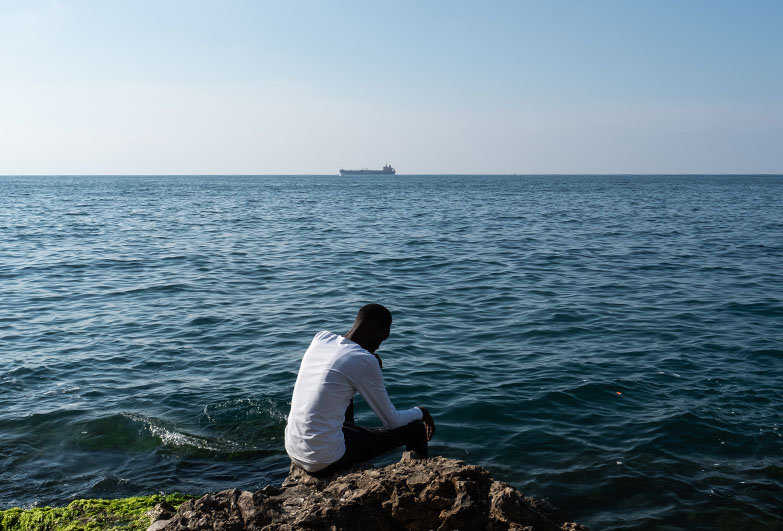
SDG Summit Gap on Forced Labour, Trafficking and Child Labour
As the SDG Summit draws to a close, we observed a worrying lack of meaningful global leadership on issues of forced labour, child labour and trafficking. In reaffirming their commitments to the 2030 Agenda and the Sustainable Development Goals (SDGs), Anti-Slavery International, alongside 90+ sector organisations, urges Member States to:
- Reaffirm their commitment, in the strongest terms possible, to the full, effective, and meaningful implementation of SDG 8.7.
- Recognising that SDG 8.7 is deeply interconnected with achieving most of the SDGs, significantly increase your Government’s efforts to address the root causes of forced labour, modern slavery, human trafficking, and the worst forms of child labour, inter alia, poverty, discrimination, gender inequality, climate change, and conflict.
- Ensure that all efforts and deliberative and decision-making processes are survivor-led, centred, and informed, and commit to adopting multi-stakeholder and intergenerational partnerships to support prevention, protection, and prosecution efforts.
See here for the open letter sent to UN Ambassadors from 73 sector organisations on 21 September.
‘Illegal Migration’ Bill briefing – House of Lords Committee Stage
The Anti-Trafficking Monitoring Group provides a detailed overview of the UK Government’s proposed “Illegal Migration” Bill. The ATMG raise deep concerns about the government’s proposed ‘Illegal Migration Bill’, which targets some of the most vulnerable groups in our society, including but not limited to, those seeking asylum, victims and survivors of trafficking and modern slavery, including separated children and those with families. The ATMG reject this Bill and urge the parliament to reject it in its entirety.
Joint Civil Society Briefing - Illegal Migration Bill
Joint civil society briefing for the House of Lords second reading – This joint civil society briefing for the House of Lords second reading of the Bill is co-written and approved by signatory civil society organisations. Anti-Slavery International has deemed this bill as cruel, unworkable and inhumane, and therefore unamendable. The Bill undermines our moral and legal obligations to victims of trafficking, refugees, and asylum seekers. Due to specialist sector experience and expertise, organisations have signed the parts of the briefing within their remit but that does not imply disagreement with the other parts.
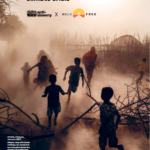
The Costs of the Climate Crisis
Anti-Slavery International co-authored an essay with Walk Free for the Global Slavery Index – see the original article here in the Global Slavery Index.
Compounding crises serve to heighten the risks of all forms of modern slavery. The COVID-19 pandemic, armed conflicts, and climate change have led to unprecedented disruption in employment and education, as well as increases in inequalities, distress migration, and reports of gender-based violence and forced marriage. Anti-Slavery International and Walk Free look at the connections between climate change and modern slavery and provide recommendations for governments.
Written Evidence submitted by the Anti-Trafficking Monitoring Group
In written evidence to the Home Affairs Select Committee, the ATMG outlines deeps concerns on developments affecting human trafficking and modern slavery in the United Kingdom through the proposed “Illegal Migration” Bill.
Briefing on the Illegal Migration Bill
This briefing on the new Illegal Migration Bill brings together the core concerns of several leading modern slavery charities across the whole of the UK. Highlighting how we view this legislation as costly, unworkable and deeply inhumane; and urging the government to scrap this plan immediately.
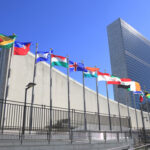
As UN Experts express alarm, coalition calls on the Government to end hostility towards survivors of trafficking and modern slavery
Today, UN experts expressed alarm at the UK Government’s use of unevidenced claims and sensationalist language towards survivors of trafficking and modern slavery, stating these attacks on the credibility of survivors and their legal representatives have a “chilling effect.” Following this release, twenty one anti-slavery organisations have released a statement calling on the Government to end its roll-back of rights and protection for survivors, and recommit to support, assistance and safeguarding for all victims of this grave crime.
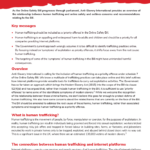
Online Safety Bill Briefing
Anti-Slavery International. The brief provides parliamentarians with an overview of the relationship between human trafficking and online safety and outlines concerns and recommendations relating to the Bill.
Download the briefing:
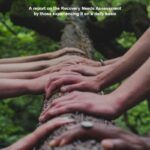
One day at a time: reviewing the Recovery Needs Assessment (RNA) (2022)
“One day at a time” looks at the experience of the Recovery Needs Assessment (RNA) process. It charters the first-hand experiences of, not only those on the receiving end of support, but also the experiences of Modern Slavery Victim Care Contract (MSVCC) support providers, along with, support workers outside of the MSVCC.
Access to work for survivors of slavery to enable independence and sustainable freedom
In order for survivors of modern slavery to recover from their exploitation, it’s essential the UK provides meaningful options to help them. This includes providing options to build independence and sustainable freedom through work, as well as through education, counselling and access to legal justice. This is a simple, achievable ask, which would do much to help survivors to move on from exploitation and to rebuild their lives. This report, produced by a coalition of organisations including Anti-Slavery International, examines the harm caused by denying survivors the right to work, as well as offering recommendations to make sure the National Referral Mechanism is reformed to allow people within the system to access work.
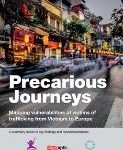
Precarious Journeys: mapping vulnerabilities of victims of trafficking from Vietnam to Europe
ECPAT, Anti-Slavery International, Pacific Links Foundation.
This research was conducted by Every Child Protected Against Trafficking (ECPAT UK), Anti-Slavery International (Anti-Slavery) and Pacific Links Foundation (Pacific Links). Over one and a half years the research investigated the issue of human trafficking from Vietnam to the UK, and through Europe; specifically Poland, the Czech Republic, France and the Netherlands to the UK. This report summarises the main findings of the research. It highlights that whilst there are many vulnerabilities which result in a person leaving Vietnam, vulnerabilities are not inherent in all Vietnamese migrants. Situational and contextual factors can increase vulnerability and risk of trafficking across all aspects of a migrant’s journey from Vietnam to Europe.
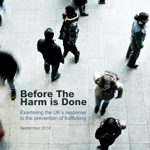
Before the Harm is Done: Examining the UK’s response to the prevention of trafficking
Anti-Trafficking Monitoring Group (ATMG)
The ATMGs report analyses action taken in the UK since 2012, relating to the prevention of human trafficking and the extent to which it contributes to the UK’s implementation of the 2005 Council of Europe Trafficking Convention and the EU Trafficking Directive requirements. The report concludes that the UK lacks an overall strategy to prevent trafficking in adults and children. The UK’s lack of strategic response means that prevention is often seen through the prism and policies of immigration and crime, hindering effective preventative action and leaving adults and children more vulnerable to exploitation.
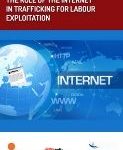
Fine Tune project Report: Trafficking for Labour Exploitation – The Role of the Internet
This report examines what role the internet plays in trafficking in human beings for labour exploitation. It considers in particular methods of online job recruitment and looks at cases studies from several EU Member States – Czech Republic, UK, Ireland, and Romania – and discusses to what extent the internet plays a role and if so, how significant the role of the internet is in facilitating human trafficking. The report is the result of the Fine Tune Project with International Trade Union Confederation (lead partner), Churches’ Commission for Migrants in Europe (Belgium) and Anti-Slavery International.
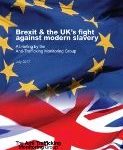
Brexit & the UK’s fight against modern slavery
Anti-Trafficking Monitoring Group.
The following paper considers the potential impact of the UK’s withdrawal (‘Brexit’) from the European Union (EU) on efforts to tackle modern slavery. The purpose of this briefing is to review the extent to which the UK’s membership in the EU has influenced national anti-trafficking efforts, and consider if and how Brexit may impact the UK’s ability to combat modern slavery and protect its victims. Where possible, recommendations have been made on the steps to take to mitigate any potential risks posed by Brexit to UK anti-trafficking efforts.
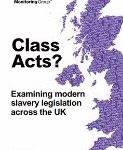
Class Acts? Examining modern slavery legislation across the UK
Anti-Trafficking Monitoring Group.
The report analyses anti-slavery legislation across the UK and highlights significant differences in a number of key areas across the three jurisdictions. In particular the research emphasises how the Modern Slavery Act falls behind the legislation in Scotland and Northern Ireland on victim protection measures. It also points out that there is no monitoring framework in place to oversee the implementation of all three Acts across the UK, including data collection and analysis. As with all of the Group’s reports, the research makes recommendations as to improvements in the UK’s anti-trafficking policy and practice.
Submission on Trafficking in Persons Bill
India: Submission on the Trafficking of Persons (Prevention, Protection and Rehabilitation) Bill 2016
Anti-Slavery International 2016
Download the report:
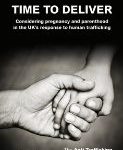
Time to deliver: considering pregnancy and parenthood in the UK’s response to human trafficking
Anti-Trafficking Monitoring Group.
This report analyses how the victims of trafficking who are pregnant or have children are ‘systematically overlooked’ in the UK’s anti-trafficking response. It identifies that support to meet this group’s special needs, such as access to safe and appropriate accommodation, childcare, access to specialist healthcare and support for their children, is not systematically provided. Despite pregnancy and parenthood having an often profound impact on the physical and psychological well-being of trafficking victims, the government’s response to trafficking fails to recognise these individuals as being particularly vulnerable.
Anti-Trafficking Monitoring Group’s Modern Slavery Bill briefings
The following briefings were supported by the Anti Trafficking Monitoring Group shared with parliamentarians to improve the Modern Slavery Bill going through the parliament.
- A briefing on the Independent Anti-Slavery Comissioner; to welcome a government amendment which allows the Commissioner to oversee victim support and assistance, but continue to call for the role to have greater independence from the government and more direct access to Parliament.
- A briefing on victim protection (Clause 49) to support an amendment to create a duty on the State to provide physical, psychological and social recovery to victims, and a separate amendment to provide for the statutory establishment of the National Referral Mechanism (NRM).
- A briefing to call for the inclusion of a separate child exploitation offence to address the potential prosecution gaps that may result from the existing offences.
- A briefing to welcome the government’s amendments to clause 48 which give child trafficking advocates full legal powers and to seek assurance from the Minister that the provision of advocates will not be dependent on a positive NRM decision.
- A briefing in support of an amendment to reinstate protections for Overseas Domestic Workers (ODWs), to allow them to change employer, renew their visa and be entitled to a 3-month temporary visa to find an alternative place of (domestic) work if they leave an abusive employment situation.
- A briefing which calls for the statutory defence to be strengthened to ensure it works effectively for children, specifically by removing the ‘Reasonable Person Test’.
- A briefing in support of an amendment to Clause 47 to ensure that legal aid could be provided to a person before an application had been made to the National Referral Mechanism (NRM) competent authority or before the competent authority had reached its NRM decision.
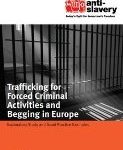
Trafficking for Forced Criminal Activities and Begging in Europe
RACE in Europe Project, lead by Anti-Slavery International.
This report analyses the phenomenon of trafficking into crime such as cannabis cultivation, ATM theft, pickpocketing, bag-snatching, counterfeit DVD selling, benefit fraud and forced sham marriage, as well as being forced to beg. The report explores the situation in the project partner countries (Ireland, the UK, the Czech Republic, and the Netherlands) and provides an overview of the rest of Europe. It exposes the dearth of systematic information and awareness about this type of exploitation amongst the policy makers and justice system actors with very few cases reported in official statistics and many victims misidentified as offenders.
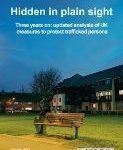
Hidden in plain sight: three years on: an updated analysis of UK measures to protect trafficked persons
Anti-Trafficking Monitoring Group.
Fourth report in the ATMG series analyses the UK’s response to trafficking four years on from the Council Of Europe anti-trafficking convention coming into force. Whilst there has been a number of improvement in the government’s response to trafficking through the National Referral Mechanism (NRM), the system fails to systematically identify, assist and protect victims of trafficking. The report highlights major problems of the UK’s system, especially looking at victims of trafficking through context of their immigration status, causing the decision making to be unfair and discriminatory.
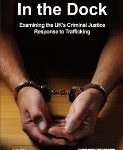
In the Dock: Examining the UK’s Criminal Justice Response to Trafficking
Anti-Trafficking Monitoring Group
This report examines the effectiveness of the UK’s Criminal Justice System’s (CJS) response to trafficking in terms of law, policy and practice. The report found that, in spite of localised examples of good practice, the CJS fails to systematically prosecute traffickers and protect victims’ rights. Despite the Government’s claims to make the UK a “hostile environment” for traffickers, human trafficking is not a policing priority.
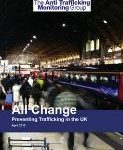
All Change: Preventing trafficking in the UK
Anti-Trafficking Monitoring Group.
The new report from The Anti-Trafficking Monitoring Group is the result of research carried out between 2010 and 2011 with the aim of examining trafficking prevention in the UK in accordance with the Government’s obligations under the Council of Europe Convention on Action against Trafficking in Human Beings. In particular, it assesses measures instigated by the UK Government to prevent trafficking/re-trafficking, highlights good practice in prevention programming and offers recommendations to strengthen the UK’s ability to prevent trafficking in the future.
Sarah Edwards (with contribution from Rachel Annison).
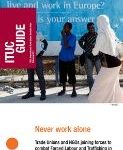
‘Never Work Alone’: Trade Unions and NGOs joining forces to combat Forced Labour and Trafficking in Europe
‘Never Work Alone’ is a guide for trade unions and other civil society organisations to jointly combat modern-day slavery and trafficking of workers. The report is the result of a two-year project in which trade unions and NGOs have looked into each other’s actions and approaches to combat slavery and labour trafficking. It examines different approaches and shows four major common grounds for action, each of them documented with a series of best practices.
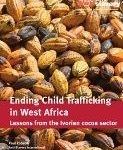
End Child Trafficking in West Africa: Lessons from the Ivorian cocoa sector
Anti-Slavery International, Paul Robson.
This report finds that trafficking of children to cocoa farms in Côte d’Ivoire still occurs. The research found significant numbers of young people in Mali and Burkina Faso who had worked as children in cocoa farms in Côte d’Ivoire in the last five years. The practices occur in the context of large-scale movements of people within the region including the trafficking of children to other agricultural activities and to other sectors.
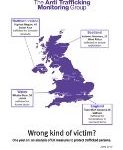
Wrong kind of victim?: one year on: an analysis of UK measures to protect trafficked persons
Anti-Trafficking Monitoring Group; Lorena Arocha; Mike Dottridge
This report by the Anti-Trafficking Monitoring Group looks at the government’s flagship ‘National Referral Mechanism’ and concludes that the UK’s new anti-trafficking measures are “not fit for purpose” and the Government is breaching its obligations under the European Convention against Trafficking. It also finds that the current system places too much emphasis on the immigration status of trafficked people rather than focusing on protecting the victims of this traumatic crime. The report also includes recommendations for the Government to reform the system.
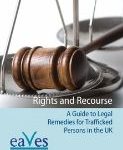
Rights and Recourse: A Guide to Legal Remedies for Trafficked Persons in the UK
Anti-Slavery International and Eaves Poppy Project
Legal guide by Anti-Slavery International and Eaves Poppy Project warns that victims of trafficking for forced prostitution and forced labour are vulnerable to being re-trafficked because of a failure of the criminal justice system to provide financial compensation for their ordeal. The guide aims to be a starting point to help lawyers take a creative and comprehensive approach in evaluating the legal remedies available to trafficking victims. It also includes two practical case studies and recommendations drawn from the experience of several practitioners in the system.
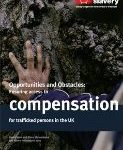
Opportunities and Obstacles: Ensuring access to compensation for trafficked persons in the UK
Anti-Slavery International
Although there has been an increase in the number of convictions for humantrafficking in the UK, legal remedies and compensation for traffickedpersons have remained inaccessible. This report identifies the legalremedies available to trafficked persons in England andWales andanalyses the effectiveness of each remedy viewed in light of itsaccessibility to trafficked persons.
Janice Lam & Klára Skrivánková
Collateral Damage 2007: The impact of anti-trafficking measures on human rights around the world
Global Alliance Against Traffic in Women (GAATW).
This anthology reviews the experience of eight specific countries and attempts to assess what the impact of anti-trafficking measures have been for a variety of people living and working there, or migrating into or out of these countries. The eight are: Australia, Bosnia and Herzegovina (BiH), Brazil, India, Nigeria, Thailand, the United Kingdom (UK) and the United States (US). The chapters look specifically at what the impact has been on people’s human rights.
Missing Out: A Study of Child Trafficking in the North-West, North-East and West Midlands
Christine Beddoe, ECPAT UK
The report highlights the cases of 80 children known or suspected of being trafficked into the UK for sexual exploitation, labour exploitation and forced marriage. More shocking is that 48 of these children have gone missing from social services care and have never been found.
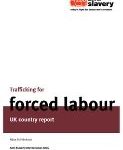
Trafficking for Forced Labour: UK Country Report
Klára Skrivánková, Anti-Slavery International
The result of research carried out by Anti-Slavery International between 2005 and 2006 with the aim of finding out more about trafficking for forced labour in the United Kingdom. This was a qualitative rather than quantative project, which aimed to provide information about how migrants become trafficked and which industries in the UK are affected. Also available an executive summary and policy recommendations.
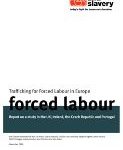
Trafficking for Forced Labour in Europe
Anti-Slavery International.
Report on a study in the UK, Ireland, the Czech Republic and Portugal This report looks at the various sectors and industries in which trafficking into forced labour occurs including agriculture, construction, domestic work and hospitality. Includes policy recommendations at a European level.
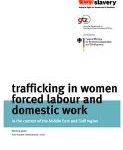
Trafficking in Women, Forced Labour and Domestic Work: In the Context of the Middle East and Gulf region
Anti-Slavery International.
This report investigates the experiences of women migrant domestic workers in the Middle East and Gulf, the dynamics and workings of the migration process and whether and how it contributes to trafficking. Also included is an examination of some of the key, inter-connecting dynamics between slavery, trafficking, migration and forced labour, focusing particularly on examples of sending, receiving and transit countries including Egypt, Ethiopia, Eritrea, Lebanon, Sudan and Yemen.
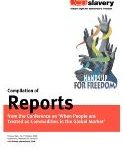
MLAL Verona Conference: Compilation of Reports from the Conference on When People are Treated as Commodities in the Global Market
Anti-Slavery International.
In October 2006, Anti-Slavery International ,CICA, IEPALA, MLAL Progetto Mondo and OIKOS participated in a two-day conference in Verona, Italy, as part of the “Hands Up for Freedom” project. Partners were invited from various countries and papers were presented on topics relating to the conference theme, “When People are treated as Commodities in the Global Market”. This report is a summary of some of the information made available during the conference in Verona.
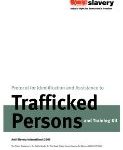
Protocol for Identification and Assistance of Trafficked Persons and Training Kit
Anti-Slavery International, Iveta Bartunkova.
This publication is a practical tool for identifying trafficked people.
It provides basic and practical information to those most likely to encounter people who have been trafficked and aims to help make the difficult task of identification easier. The manual includes lists of indicators, checklists and recommends questions for interviewing trafficked people. The training kit is designed for training front-line workers.
Eastern Africa Conference 2005: Report of the Eastern and Horn of Africa Conference on Human Trafficking and Forced Labour
ANPPCAN, Anti-Slavery International.
Details the proceedings and recommendations of the conference held in Nairobi from 5-7 July 2005. The conference discussed contributing factors to trafficking and forced labour, including armed conflict, debt bondage, education and child labour, drugs and transnational crime, and national and international adoption. It also examined various regional and international responses.
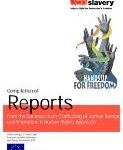
Hands Up For Freedom Conference : Compilation of Reports from the Conference on Trafficking of Human Beings and Migration: A human rights approach
Anti-Slavery International.
In March 2005, Anti-Slavery International and other non-governmental organisations including CICA, IEPALA, MLAL Progetto Mondo and OIKOS took part in a conference in Lisbon, Portugal. The issues of trafficking and migration in Italy, Portugal, Spain and the United Kingdom were discussed, including the current siutation, government action and recommendations for change. Global partners presented papers on topics relating to the conference’s theme. The report is a summary of information made available during the conference.
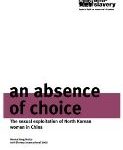
An Absence of Choice: The sexual exploitation of North Korean women in China
Anti-Slavery International.
This report exposes the vulnerability of North Korean women who flee to China to trafficking. A wide range of case studies documents trafficking into sexual exploitation and forced and ‘arranged’ marriages. It makes a case for North Koreans in China to be considered refugees and concludes with recommendations of what action needs to be taken.
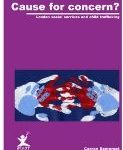
Cause for concern?: London social services and child trafficking
ECPAT UK.
ECPAT UK’s latest report on child trafficking into the UK. Cause for Concern? includes interviews with social services in all 33 of London’s boroughs to gauge social workers’ awareness of trafficking and record cases of children who have been trafficked to the capital. Twenty-six boroughs reported that they had worked directly with children who had been trafficked or who had been brought into the UK and were living in suspicious circumstances. It includes case studies, statistics and recommendations.
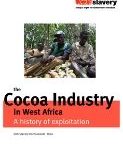
The Cocoa Industry in West Africa: A history of exploitation
Anti-Slavery International.
This report provides an in-depth analysis of how cocoa is produced and how child and slave labour enter its chain of production. It relates the history of cocoa production and explores how this commodity fits within a global market. Drawing on a wide range of sources, it concludes with recommendations for consumers, the chocolate industry and governments on actions needed to address this serious problem.
Comments on revised draft European Convention on Action Against Trafficking in Human Beings
Amnesty International, Anti-Slavery International.
Amnesty International and Anti-Slavery International assess some of the articles in the draft of the European Convention on Action Against Trafficking in Human Beings in relation to existing international standards and commitments. In the light of this analysis and our experience of working both with and on behalf of trafficked people, we recommend ways in which the text can be amended to ensure the treaty creates a comprehensive framework that protects and respects trafficked people’s human rights.
NGOs’ Statement on Protection Measures for Trafficked Persons in Western Europe
NGOs from five Western European countries — Germany (KOK) , Greece (STOP NOW), Italy (On the Road), The Netherlands (STV) and United Kingdom (Eaves Housing for Women and Anti-Slavery International) — presented this joint statement on protection measures for trafficked people at the OSCE Human Dimension Implementation Meeting in Warsaw in October 2003.
Stresses the need for appropriate measures for the identification of trafficked people to prevent their immediate deportation, need of right to a reflection delay, temporary or permanent residency status for trafficked people and need for means to ensure that the residency status allows the trafficked person full social inclusion.
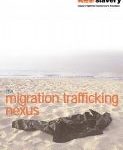
The Migration Trafficking Nexus: Combating trafficking through the protection of migrants’ human rights
Anti-Slavery International.
Trafficking, smuggling and migration are separate, but inter-related issues. This publication seeks to look at the issue of trafficking within a broader migration framework and to propose policies which would be effective in reducing trafficking and in preventing the human and labour rights violations to which migrant workers are so often subjected today. Also available in Spanish and Khmer. ISBN 0 900918 58 6
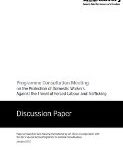
Programme Consultation Meeting on the Protection of Domestic Workers Against the Threat of Forced Labour and Trafficking: Discussion paper
Anti-Slavery International.
Paper prepared for Anti-Slavery International by Lin Chew, in co-operation with the International Labour Organization’s Special Action Programme to Combat Forced Labour.
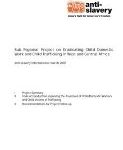
Sub-Regional Project on Eradicating Child Domestic Work and Child Trafficking in West and Central Africa: Code of Conduct English
Anti-Slavery International.
This summary from Anti-Slavery International’s French language report includes a Code of Conduct for improving the treatment of child domestic workers and child victims of trafficking, as well as recommendations for action. Anti-Slavery International set up a network of child rights organisations in six West and Central African countries: Bénin, Burkina Faso, Gabon, Ghana, Niger and Togo, in order to strengthen their ability to work together for the eradication of abusive forms of work and the worst forms of child labour.
Combatting Trafficking in Persons: A directory of organisations
CHANGE Anti-Trafficking Programme.
Information of activities and services offered by organisations around the world that are working towards the elimination of human trafficking. It aims to facilitate co-operation and the establishment of networks and partnerships, aid effective referral for trafficked people (psychological counselling, long-term shelter provision and skills training), assist personnel who have identified a victim of trafficking to make contact with relevant service providers and provide an overview of the trafficking situation in each country. Also provides background on legislation and the types of services provided by organisations and institutions in this area. ISBN 0 907236 35 9
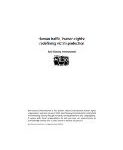
Human Traffic, Human Rights: Redefining victim protection
Anti-Slavery International.
This report looks at measures to protect trafficked people in Belgium, Colombia, Italy, the Netherlands, Nigeria, Poland, Thailand, Ukraine, the UK and US. It includes case studies, documents good and bad treatment by authorities and concludes with recommendations. Download PDF versions of the complete report, individual chapters or of the executive summary, which is also available in French, Portuguese, Russian and Spanish. The complete version of the report is also available in French.